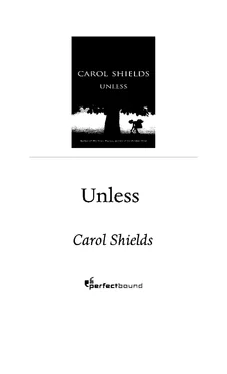Carol Shields - Unless
Здесь есть возможность читать онлайн «Carol Shields - Unless» — ознакомительный отрывок электронной книги совершенно бесплатно, а после прочтения отрывка купить полную версию. В некоторых случаях можно слушать аудио, скачать через торрент в формате fb2 и присутствует краткое содержание. Жанр: Современная проза, на английском языке. Описание произведения, (предисловие) а так же отзывы посетителей доступны на портале библиотеки ЛибКат.
- Название:Unless
- Автор:
- Жанр:
- Год:неизвестен
- ISBN:нет данных
- Рейтинг книги:4 / 5. Голосов: 1
-
Избранное:Добавить в избранное
- Отзывы:
-
Ваша оценка:
- 80
- 1
- 2
- 3
- 4
- 5
Unless: краткое содержание, описание и аннотация
Предлагаем к чтению аннотацию, описание, краткое содержание или предисловие (зависит от того, что написал сам автор книги «Unless»). Если вы не нашли необходимую информацию о книге — напишите в комментариях, мы постараемся отыскать её.
Unless — читать онлайн ознакомительный отрывок
Ниже представлен текст книги, разбитый по страницам. Система сохранения места последней прочитанной страницы, позволяет с удобством читать онлайн бесплатно книгу «Unless», без необходимости каждый раз заново искать на чём Вы остановились. Поставьте закладку, и сможете в любой момент перейти на страницу, на которой закончили чтение.
Интервал:
Закладка:
I’m not interested, the way some people are, in being sad. I’ve had a look, and there’s nothing down that road. I wouldn’t reply, as Anna Karenina does when asked what she’s thinking about: “Always about my happiness and my unhappiness.” The nakedness of that line of thought leads to a void. No, Ms. Winters of Orangetown much prefers the more calculated protocols of dodging sadness with her deliberate manoeuvres. She has an instinct for missing the call of grief. Scouring the separate degrees of innerness makes her shy. A reviewer writing about My Thyme Is Up two years ago charged its author — me — with being
“good” at happy moments but inept at the lower end of the keyboard. Well, now! What about the ripping sound behind my eyes, the starchy tearing of fabric, end to end; what about the need I have to curl up my knees when I sleep? Whimpering.
Ordering my own house calms me down, my careful dusting, my polishing. Speculating about other people’s lives helps, too. These lives hold a kind of tenancy in my mind, tricking the neural synapses into a grand avoidance of my own sorrow. The examined life has had altogether too much good publicity. Introversion is piercingly dull in its circularity and lack of air. Far more interesting, at least to a fiction writer going through a bad time, is the imaginative life projected onto others. Gwendolyn Reidman in Baltimore has just come out as a lesbian; the news arrived via a note from a bed-and-breakfast place called the Inglenook, and so far I’ve put off my reply. And there’s Emma Allen off with her daughter and daughter-in-law to a spa, where the two younger women will give themselves over to mud wraps and massages and leave Emma, who’s forty-four, the same as me, to feel guilty about falling into the vanity trap. Then there is Mrs. McGinn, who whispers her loneliness through the floorboards and who, in all probability, shook her dust mop on the same porch railing I banged on this morning, doing my daily rounds. There’s the violet late-afternoon autumn transparency entering the box room from the skylight, precise and square, and the creak of ancient tree trunks bending in the gusty October wind. Up here, on the third floor of the house, my senses sharpen and connect me with that other Reta, young Reta, not really so far away.
There’s my dead mother, who taught me French and also thrift. Every day her image rises up in one form or another, brushing against me with a word or gesture or sometimes the remembrance of a simple recipe: mousse au citron, Chantilly cream. Doucement, doucement, I hear her say; use the fork and only the fork, be gentle, be patient. Who else? There’s Lois, my still-living but silent mother-in-law, and this is a silence I must deal with soon, or get Tom to deal with. And, of course, there is the immense, hovering presence of Danielle Westerman with her European-based culture, her thin, distinguished chin, her boxy knuckles and long crimson nails. Would Danielle approve? I scarcely ever budge from my habitual stances or perspectives without causing that stern question to flap against my ear. Last week I disappointed her by using the word veggies. She had thought better of me, I could tell.
These human mysteries — cleaning my house, fantasizing about the lives of other people — keep me company, keep me alert.
But more than anything else it is the rhythm of typing-and-thinking that soothes me, what is almost an athlete’s delight in the piling of clause on clause. Who would have thought this old habit of mine would become a strategy for maintaining a semblance of ongoing life, an unasked-for gift, une prime. On days when I don’t know which foot to put in front of the other, I can type my way toward becoming a conscious being. Writing a light novel is very much as Mr. Scribano promised: a diversion, a forgiving place with fine air and moisture and attractive people seen through nicely blurred light. I can squeeze my eyes shut, pop through a little door in the wall, and stand outside my child’s absence. I can hush the critical voice in my head that weighs serious literature against what is merely entertainment. A quick read. A beach book. Light, lightly. The kind of shallow invention this particular genre demands is as healing as holy oil. “Deep down we’re all shallow” — who said that?
The pages of the new manuscript add up quickly, though narrative coherence is in short supply in the early chapters. I’ve already blocked in the happy ending, but now I have to throw a few hurdles in the way. Roman and Alicia have set the date for their wedding. The invitations have already been mailed to their families and friends, beautifully lettered on rice paper by Alicia herself, who has a gift for calligraphy. But there are complications, and some of these I have yet to work out. I don’t want to overburden my people with neuroses; I want to suggest a rumple of complication disturbing their psychic normalcy. Alicia has one or two remaining doubts about marriage to Roman. She’s seen the way he gets itchy and feverish when he’s around her friend Suzanne. This is her second marriage, after all, and she’s been warned that musicians are unstable. Roman plays trombone in the Wychwood Symphony, Wychwood being my fictional city, a self-important, swaggering cousin to Toronto. Alicia has noticed that Roman is inattentive to his personal hygiene, and has to remind herself that his odour of musk was attractive to her in the early days. His forthright chin suggests conceit.
When he’s in the presence of men who are taller than he is, he becomes faintly obsequious, and touches his mouth rather a lot, like the Mrs. McGinn of my imagination. This is beginning to get on Alicia’s nerves, and she’s thinking of mentioning it to him. Meanwhile Suzanne — Suzanne does something, something unpardonable, but finely modulated in its intent. Or perhaps it is Sylvia, the symphony’s bassoonist. The details must be worked through.
In all probability Roman is having second thoughts about the marriage, too, but I am not inside Roman’s massed angular head. It is Alicia’s skin I wear. I see through her woman’s eyes, reach with her woman’s fingers, stroking the thick and rather sticky wool of Roman’s brushed-back hair. Should something be said to him about his brand of hair gel? Soon. And how painstakingly must I describe Alicia’s apartment? Fiction demands such pitiless enumeration; I’ll try to get away with light wood furniture, tall windows, a palette of sunny colours, and a few pieces of Polish amber scattered here and there just so, catching the natural light. And the matter of cars? This has to be settled. Alicia doesn’t own a car; she thinks a car is too expensive to keep in a city like Wychwood. Roman has a car, a Honda Civic, a model from the early nineties. He looks after it beautifully. Just a week ago he replaced the rubber floor mats instead of scrubbing the old ones.
I can deconstruct Alicia’s acute feminine sensibility for an hour or more, depending on whether I can keep myself from coasting into a secondary fiction, the compacted imaginative ravellings that collect around the end of each writing hour. A fantasy of mine: Norah is sleeping downstairs in her bedroom. In my mental movie she has come home, exhausted, hitching a ride from Toronto. Every rerun is the same. She appears, suddenly within the protection of our walls. She is slightly feverish with flu, but nothing serious, nothing a few days in bed won’t fix. In a few minutes I’ll take her some lemon tea. My daughter, my sick daughter. I don’t want to wake her, though. Waking a sleeping person seems to me a particularly violent act. This is how political prisoners were tortured in China — or was it Argentina? — with an intricate and automatic alarm system cutting in five minutes after sleep commenced so that the already tormented bodies were shocked by sleep deprivation and whipped with chronic distrust.
Читать дальшеИнтервал:
Закладка:
Похожие книги на «Unless»
Представляем Вашему вниманию похожие книги на «Unless» списком для выбора. Мы отобрали схожую по названию и смыслу литературу в надежде предоставить читателям больше вариантов отыскать новые, интересные, ещё непрочитанные произведения.
Обсуждение, отзывы о книге «Unless» и просто собственные мнения читателей. Оставьте ваши комментарии, напишите, что Вы думаете о произведении, его смысле или главных героях. Укажите что конкретно понравилось, а что нет, и почему Вы так считаете.












